ANZURA’s presentation of The Urantia Book at the Parliament of the World’s Religions
December 3–9, Melbourne, Australia 2009
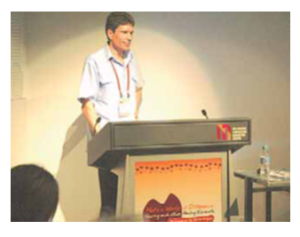 Hi, my name is Nigel Nunn. My background is mathematics and astrophysics. I study how stars collapse and the shape of space & time. So what am I doing at a parliament of religions, talking about Love?
Hi, my name is Nigel Nunn. My background is mathematics and astrophysics. I study how stars collapse and the shape of space & time. So what am I doing at a parliament of religions, talking about Love?
Well, when I was about 16, I suffered one of those moments of “peace that passes all understanding”. For a minute or two, my anxieties and fears, my desires and illusions all just melted away. This peace, together with feelings of such clarity and love, were so intense (and so interesting!) that those usual things that move teenagers, like sex, drugs and rock & roll, began to seem pale in comparison. As we know, idealistic teenagers are excited by the idea of a “Quest”, and I now had mine: to discover what it is about ourselves that can experience such intensity of peace, such depth of love.
I survived a final year of school, then soon found myself in that extraordinary “Adyar Bookshop” in Sydney, run by the Theosophical society. Over the next 8 or 9 months, I read my way through much of their stock of theological and philosophical works, sacred texts and mystical manuscripts.
I became aware of surrendering and submitting to God, of being “slain by the spirit” and “born again”, of chakras and yogas, of etheric bodies and astral travel, of that well-mapped path through my squirming addictions, past the death of my delusions, into the nearness of Nirvana. And of taking holidays, blissed out in the right hemisphere of our brain.
But what did it all mean? When personal, one-on-one contact with God is so available, so beautiful, so free, why all these systems of faith, these rituals and doctrines? How and why did they evolve? What on earth is going on? I felt it was time to take a different tack.
I approached the lady behind the counter and thanked her for allowing me to read all her books, then I asked: “Have you got something… bigger, something comprehensive, something that brings together and explains all these experiences and beliefs?”
“Well,” she said, reaching under the counter and pulling out The Urantia Book, “There is this.”
* * *
That was 1979, 30 years ago. Over those 30 years, I have continued to be intrigued by these papers. And I have evolved some ideas and images that for me, help answer those questions of what and who and why we are. But most especially, some ideas have been ripening on the origin, the nature and the purpose of Love—what is this thing we call love, and what role does love play in the universe?
This afternoon, I would like to try and share with you a glimpse of the insights I have found within these extraordinary & unexpected papers. But first, let’s begin with the reason we are all here in Melbourne, and consider this Parliament’s theme:
“Making a difference – hearing each other – healing the earth.”
Anyone who has done time working as a peace-maker or mediator will notice some challenges implied by this theme. For example, when two or more of us try to work together, to “make a difference”, what if we are not on the same page? What if, after listening, hearing and understanding each other, we discover that our aspirations diverge? That our plans for Peace actually conflict?
We can all point to heroic attempts to foster “peace and understanding…” that have failed. This makes one wonder: why do so many such “well-laid plans” unravel? Why (so often) do we see such small return from such big investment of good intentions? Has there been something missing in previous attempts to “make a difference”, to hear each other, to repair the damage we cause?
Has there been something missing? A few fundamental things come to mind: we have never had a shared, planet-wide understanding of who and what we really are; we have never had a shared, planet-wide under-standing of what this world is for; and there has been an obvious shortage of Love, that essential desire to do good to each other.
These Urantia Papers offer some ideas about all these things, but first, let’s consider what we—this parliament—represent, this attempted interaction of our separated faiths. It was religious insight, through revelation or through prophets, that fostered these systems-of-faith (these separated systems of faith) that now require our inter-faith effort. As we know, each of these systems-of-faith have their more adventurous members, those who go deep, to the roots, to the very heart of their tradition. Should we be surprised if they each discover one God, one Source of Truth, one Center of Love? Yet when they return from their experience with the divine, back to their culture, back to their system of faith, when they try to describe what they discover—their personal insights into Truth, their experience of Love—they are held back: by language, by those boxes of concept and culture within which we live, by those frames in which we think. Is it any wonder that those who actually walk with God are forced simply to say “too deep for words”?
But what if they had words? What if such pioneers could share a vocabulary, a “vocabulary of concepts” ,one big enough not only to describe, but also to explain their experience with God? What if each of us were offered a new perspective, one in which our true nature becomes clear? What if we all knew exactly what this world is for, so that peace-makers and mediators at least could begin on the same page? Could new truth about ourselves—about who and what we are, about what this world is for—help us as we try to make a difference, to help, to hear, to heal? But how do we access “new truth” about ourselves?
This is where these Urantia Papers may be able to help.
You remember that poet, in Palestine, almost 3,000 years ago, whispering to his God:
“What is man, that you are mindful of him?” [Psalm 8:4]
Even today this remains a really good question: Why should the Author of Reality be interested in us? What’s one more planet-full of humans to the Creator of an eternal infinity? Well, this is precisely the question addressed by The Urantia Book.
Now, at first glance some may say, “well, they were a bit long-winded, weren’t they? 196 separate papers? Over 2,000 pages of dense text?” Others, like those of you who know the source of truth and love, may say “yes, but… they’ve made some simple truths way too complex.”
Ok. But if this answer is to be appropriate for the sceptical, scientific age ahead, if it is to be sufficient, satisfying for scientists and philosophers, for mystics and religionists alike, think what was required:
Before they could begin to explain our bodies and our minds, they had to adjust our basic assumptions about biology and psychology. Before they could begin to explain how worlds and stars and galaxies like ours evolve, they had to rework the foundations of our entire physics and cosmology. And before they could even BEGIN to explain how we are salvaged from death—how we are salvaged from death—they had to reveal something of that extraordinary domain which bridges the material and the spiritual. And of course our beliefs, ideas and experiences of “the spiritual” could do with some… clarification.
All this preliminary explaining and setting up implies… a biggish book. And here it is, all 2kg worth, as first printed. (No wonder they used to call it “Big Blue”!)
So, how do the authors of these papers answer that poet’s simple questions? What, do they say, is Man? Why, do they say, might God be “mindful of” us? Who are we? What are we doing here? What fresh ideas do these papers bring to the table? What revelations about ourselves do these revelators reveal?
Well, here we face an issue: while personal revelation of truth and love unfolds within, in ways “too deep for words”, a planetary, or epochal revelation, as these papers claim to be, must be planted in a form that we can (easily) share: as “words”, as a set of those “ideas whose time has come”, as a framework of concepts that can be grafted onto those paradigms our various cultures have evolved.
And this is what is being attempted here. To allow them to present appropriate answers to these simple, crucial questions, the authors of these papers had to sketch out a cosmology, a “universe frame”, big enough and consistent enough to contain the answers they are attempting to give.
So The Urantia Book is offering us two things: the first is simply a description of the way things are, a new and wider frame in which to think; the second is something that required this wider frame: a revelation about ourselves.
Ok, so why should a new frame-in-which-to-think be interesting, let alone valuable? Well, just think about the struggles we have when we try simply to work together, to co-operate. When we talk about two people “being on the same page”, we imply they share similar assumptions and aspirations, a similar world-view. In this sense, we people of this world are not quite on the same page. Some of us are on a page that explains, in logical detail, how we can get to Paradise by blowing up a crowd of struggling souls; some of us are on a page that utterly fails to mention the Author of Reality, and explains, in logical detail, why “greed is good”. And many of us are on a page that is almost blank, wandering along alone, wondering what on Earth is going on.
In this sense, our very neighbors—our classmates and workmates—may be living a world apart, separated by conflicting beliefs about the world. In this same sense, these papers may be able to serve as a Rosetta Stone, helping translate our experience of reality, while helping reveal to us all a larger world.
To get a feel for the scope, and breadth of this larger view, we need only glance at the very first section of the book, those first 6 pages called “Titles of the Papers”. To anyone with some background in archaeology or philosophy, theology or physics, each of these titles will be provocative (if not outrageous!). But when read sequentially, and taken together, the more descriptive, narrative papers help to set up an entire world view, a new and surprising description of reality. And this larger, deeper view will be needed if we are to understand the essence and purpose wrapped up within this book. This “essence and purpose” is a revelation about ourselves, which brings us to where William left off: consideration of Personality, Adjuster and Soul.
Now, personality: we all know what personality is. It’s … hmmm. Well, soul: we all know precisely what the soul is. It’s … hmmm. Well, God: we all know about this presence of God within. It’s …
I think we would all agree, each of these rather important things have not been well understood. However, as William explained, these papers present each of these concepts in an entirely new light.
First, they reveal the true nature of Personality, an order of reality distinct from (and antecedent to) matter, mind and spirit.
Second, they reveal the true nature of the presence of God within—our ancient and higher self, the incarnating essence of eternal deity. Such mystical hints at some marvelous truth are expanded, clarified and made real to our minds via the concept of the “Adjuster”, the indwelling fragment of “our Father who art in Heaven”, the gift of spirit essence which is destined to define what we will be.
And third, they redefine the concept of the soul. They reveal soul to be the culmination of our mortal life, a phenomenon created by our wilful personality responding to our potential higher self. They also reveal how our soul, bridging the gulf between material life and spirit destiny, serves as a technique for salvaging us from death.
To help set the scene, let’s hear something from the authors themselves about each of these things:
About personality, they say this:
“The love of the Father absolutely individualizes each personality as a unique child of the Universal Father, a child without duplicate in infinity, a will creature irreplaceable in all eternity.” [Paper 12:7.4, page 138.4]
“Personality is the one changeless reality in an otherwise ever-changing creature experience; and it unifies all other associated factors of individuality. The personality is the unique bestowal which the Universal Father makes upon the living and associated energies of matter, mind, and spirit, and which survives with the survival of the morontial soul.” [Foreword:5.11, page 9:1]
About the Adjuster, they say this:
“The Adjusters are the actuality of the Father’s love incarnate in the souls of men; ”
[Paper 107:0.2, page 1176:2]“The Adjuster is an absolute essence of an infinite being ” [Paper 107:0.6, page 1176:6]
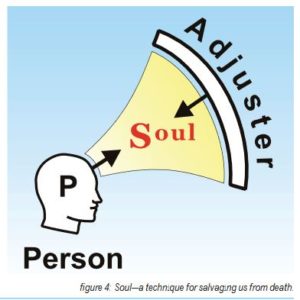
fig4: soul: a technique from salvaging us from death
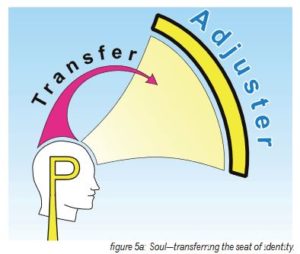
fig 5a: transferring the seat of identity
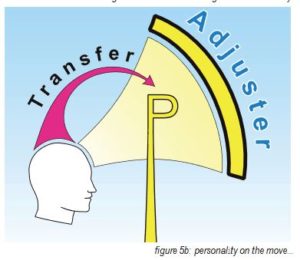 fig 5b: personality on the move
fig 5b: personality on the move
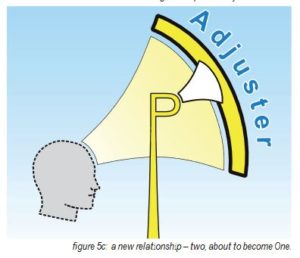 fig 5c: a new relationship-two about to become ONE
fig 5c: a new relationship-two about to become ONE
And about the soul, they say this:
“Personality may survive mortal death with identity in the surviving soul. The Adjuster and the personality are changeless; the relationship between them (in the soul) is nothing but change, ” [Paper 112:0.15, page 1226.3]
Our separate cultures and our systems of faith have each evolved beliefs about these things. Such ideas may have been ideal and appropriate—within a culture, once upon a time. But now that our cultures overlap, how do we share our ideas and experiences? There are now so many different beliefs about the nature of the soul that it becomes hard to discuss the idea. Our experiences of the presence of God within are simply too deep for words, so how can we even begin to discuss this? And we tend to think of personality merely as the way we react and respond, more an issue of psychology than of truth. Our reflection and discussion about these things has been stuck in those boxes of concept and culture within which we live, bound by those frames within which we think.
“Man must think in a mortal universe frame, but that does not mean that he cannot envision other and higher frames within which thought can take place.” [Paper 115:1.2, page 1260.3]
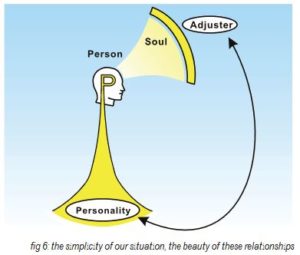
fig 6: the simplicity of our situation, the beauty of these relationships.
Simplicity and complexity
But the simplicity of our situation, the beauty of these relationships, can be hidden by old words, and new jargon. Jesus said that we are the children of God. Jesus—the fourth epochal revelation of Truth to this world—revealed that the Universal Father is our Father; “Our Father, who art in Heaven… ”. Simple. The most important and most simple truth a Person can ever know. A simple truth that trumps all the fourth epochal theology and philosophy our world has suffered.
 But simplicity can hide a true complexity. Think of a child switching on a light. What could be more simple? But to the electrician, this is many problems to be solved: getting all that wiring in place, connecting with the power grid, the guarantees of safety… so that even a child need only flick a switch to fill a room with light.
But simplicity can hide a true complexity. Think of a child switching on a light. What could be more simple? But to the electrician, this is many problems to be solved: getting all that wiring in place, connecting with the power grid, the guarantees of safety… so that even a child need only flick a switch to fill a room with light.
fig 7: simplicity from complexity
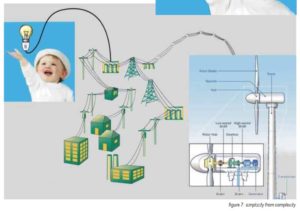
Something like this is happening in space-time, and for us. Our father has made of this little world a home where we need only “flick a switch” to come to life. To be filled with that “true light which lights every man who comes into the world” we need only say…
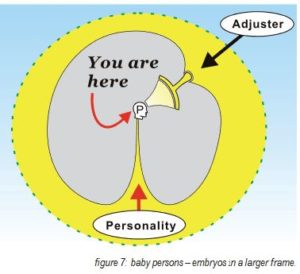
“Yes!”, then hang on for the ride of our life!
This simple, central Truth, that God is our Father, is the tip of an iceberg; the simple, beautiful tip of a vast mountain of details, of mind boggling complexity. The relationships and interactions of spirit, mind and matter that allow us to exist; the tapestry of meanings and values that forms the fabric of the finite creation. But this is not our problem. Our Father’s Paradise Sons, have volunteered to resolve this complexity, to make smooth the way, to make possible our creation and perfection. All we need do is to live loyally each moment as tad-poles, to work our little tails off in the joyful adventure of growing up:
“The quickest way for a tadpole to become a frog is to live loyally each moment as a tadpole.” [Paper 100:1.4, page 1094:6 ]
Conclusion
The Urantia Papers reveal personality to be so fundamental—as first source of everything and the destiny of all—that the Universal Father did not, or could not, delegate its care. The Papers also reveal an absolute transition—of particles of personality into free-will universe Sons.
This transition is caused by the Universal Father, and powered by love: “Let us make mortal man in our own image.” This request by the Father becomes a command through the Son. The hosts of Havona stir, the machinery of Paradise responds, the most wondrous adventure begins: SONS, made as if from nothing to become ones like the Father; made from mortal stuff on the worlds of time; in the quiet places of a qualified, finite space. We are told that such transformations are an opportunity unique to this brief AGE OF TIME, but we are left to guess what ramifications may ripple from our birth.
So what’s Love got to do with it? Jesus was once asked by his apostles if it was really a good idea to make love the central theme of their message. How could a mere ideal like love compete with Roman swords?
Jesus rarely showed strong emotion, but that day in Archelais, when it became clear that his team of apostles still had almost no idea about love, he could not hold himself back. He knew love, he came to us directly from its Source and Center:
“But I declare to you that my Father in Paradise does rule a universe of universes by the compelling power of his love. Love is the greatest of all spirit realities. Truth is a liberating revelation, but love is the supreme relationship.” [Paper 143:1.3, page 1608:1]
Within the frame set up by these papers, we can now trace the rise and role of LOVE, from the eternal core of the Absolute directly into the human heart. We were meant to be here, we are not alone, and every single one of us is very greatly LOVED.
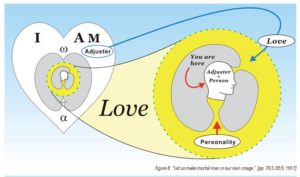
fig 8: “Let us make mortal man in our own image”

